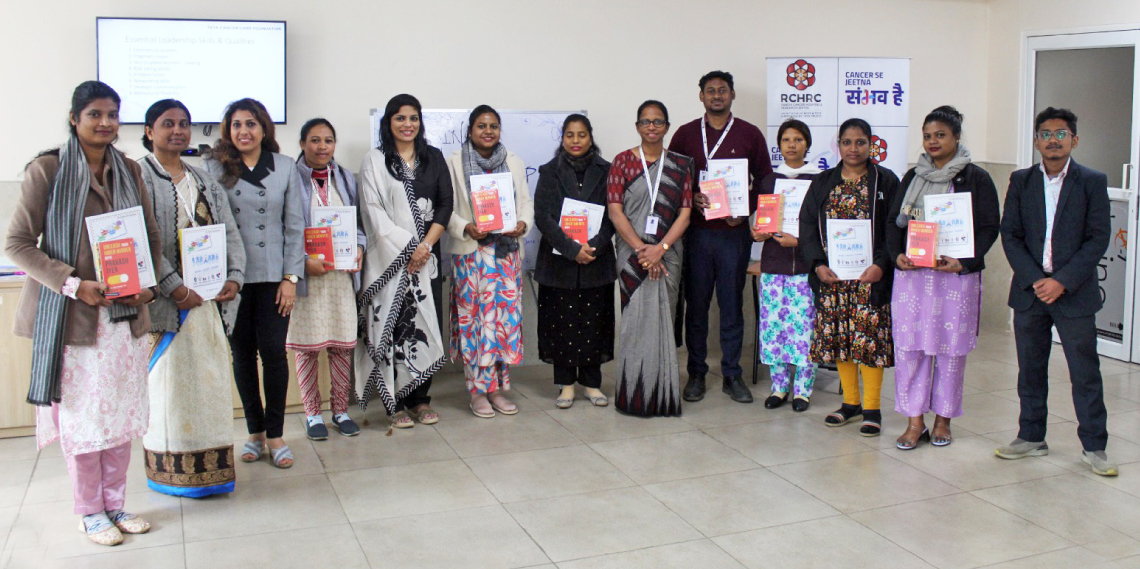Creating the core
Centres and institutions that provide affordable and high-quality treatment are central to the cancer care initiatives of the Tata Trusts
It was October 2022 and the back pain and breathing trouble had got so bad that Subamma P (name changed) could no longer manage her daily chores. A local physician, suspecting the worst, recommended tests at the then newly inaugurated Sri Venkateswara Institute of Cancer Care and Advanced Research (SVICCAR) hospital in Tirupati, the temple town in Andhra Pradesh near where Ms Subamma lived.
A detailed diagnosis confirmed that Ms Subamma had lung cancer. That was the bad news, but good tidings were on their way. Thanks to a customised treatment protocol and the best of care, Ms Subamma started recovering, and quickly. Her progress was so remarkable that within a couple of months she was rid of her pains and back in charge of her home. That Ms Subamma could count on SVICCAR was crucial.
Affordability and quality of care are the defining features of SVICCAR, established by the Tata Trusts at a cost of about ₹1.8 billion on a land parcel contributed by the Tirumala Tirupati Devasthanams (the trust that manages the famous Tirumala Venkateswara Temple). Spread over 156,000 square feet, it is one of the most advanced cancer hospitals in the region, with high-tech equipment and an expert staff that can cater to about 5,000 patients every year.
SVICCAR is a stellar example of one of the more remarkable and understated aspects of the Tata Trusts’ efforts in cancer care and treatment — seeding and fostering a slew of cancer facilities across India.
The cancer care thrust of the Trusts got a fillip with the setting up of the Tata Cancer Care Foundation (TCCF) in 2017. The Foundation’s objective is to help ensure affordable, high-quality cancer care to millions of Indians closer to their homes. “The intent is to set up good cancer centres in places where there are no such facilities,” says Dr Kailash Sharma, head, clinical service, training and education at TCCF, and a veteran with over 35 years of experience at the Tata Memorial Hospital (TMH) in Mumbai.
The need for a robust ecosystem that addresses cancer is evident. India reports more than 1.4 million cancer cases a year, with one in nine Indians likely to develop cancer in their lifetime. There is a huge need for diagnostic and treatment facilities as close as possible to where cancer patients live.
To this end, the Trusts’ cancer care programme supports a dispersed network of facilities. Since 2017, cancer hospitals have been set up and supported in multiple states under the programme, in Andhra Pradesh, Assam, Jharkhand, Karnataka, Maharashtra and Uttar Pradesh. That is in keeping with a concern that dates back to 1941, to the establishment of India’s first and best-known cancer centre, TMH in Mumbai.
In 2011, the Tata Medical Center (TMC) was founded in Kolkata. Created by the Tata Trusts, with contributions coming in from Tata companies as well, the 437-bed TMC addresses the dire requirement for top-notch and equitable cancer care in a region sorely lacking such a facility. Post an expansion completed in January 2019, it is now better placed to cope with an unending rush of patients.
In Assam, the Trusts have gone deeper with a distributed cancer care model spread across the state, with 10 cancer centres on board under the Assam Cancer Care Foundation, which operates as a partnership with the state government.
Screening spread
A pillar of the Trusts’ cancer ecosystem is screening to improve community outreach and cancer prevention. This is managed through screening kiosks, at hospitals and elsewhere, to maintain a registry of patients and to track the disease at the community level.
The bigger institutions are the key, for sure, among them the Ranchi Cancer Hospital and Research Centre (RCHRC) in Ranchi, Jharkhand. Now a 100-bed facility, RCHRC was set up by the Tata Trusts and began functioning in 2022 and has reached more than 55,000 patients thus far, while also screening 258,000 people for common cancers.
Jharkhand is home to one more significant cancer facility, the 130-bed Meherbai Tata Memorial Hospital in Jamshedpur. Established in 1975 and managed by Tata Steel, the facility was upgraded to a full-fledged cancer centre by the Trusts in 2018.
In Varanasi, the Trusts — along with TMH, Mumbai — have worked with the Banaras Hindu University to set up the Mahamana Pandit Madan Mohan Malaviya Cancer Centre. Also in Varanasi is the Homi Bhabha Cancer Hospital, a former Indian Railways hospital that was upgraded by the Trusts. This now specialises in child cancers and bone marrow transplants.
In Maharashtra, there are several facilities supported by the Trusts in and around Mumbai, many of them connected to TMH. In Chandrapur, the Trusts-backed Chandrapur Cancer Care Foundation is collaborating with the state government to build a 140-bed facility. “There are a large number of cases and no suitable hospital in this tribal-dominant area,” explains Dr Sharma.
Built to last
The major cancer facilities that the Tata Trusts have helped establish…
- Tata Memorial Hospital, Mumbai
- Tata Medical Center, Kolkata
- Sri Venkateswara Institute of Cancer Care & Advanced Research, Tirupati, Andhra Pradesh
- Ranchi Cancer Hospital and Research Centre, Ranchi, Jharkhand
- Meherbai Tata Memorial Hospital, Jamshedpur, Jharkhand
- Mahamana Pandit Madan Mohan Malaviya Cancer Centre, Varanasi, Uttar Pradesh
- Homi Bhabha Cancer Hospital, Varanasi, Uttar Pradesh
- Chandrapur Cancer Hospital, Chandrapur, Maharashtra
- 10 cancer centres in Assam (Guwahati, Dibrugarh, Barpeta, Diphu, Silchar, Tezpur, Lakhimpur, Jorhat, Darrang and Kokrajhar)
There are other, smaller, components in the Trusts’ canopy of cancer care. In Mangalore, Karnataka, the Trusts have helped the Yenepoya Cancer Centre source and set up key equipment, and in Silchar, Assam, TCCF is setting up a nuclear medicine unit at the Cachar Cancer Hospital and Research Centre.
The centres and institutions established by the Tata Trusts are testament to the organisation’s continuing commitment to improve India’s cancer care ecosystem.
